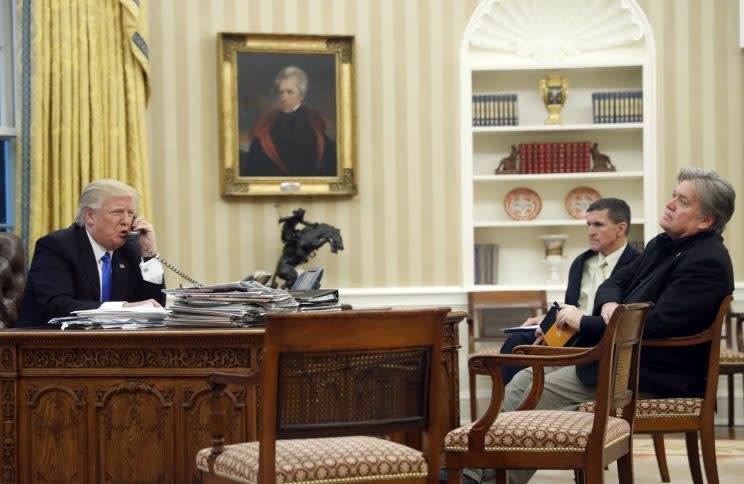Watchdog blames Trump for spike in anti-Muslim hate groups

The number of hate groups in the United States rose for a second consecutive year (from 892 in 2015 to 917 in 2016), according to a new report from the Southern Poverty Law Center (SPLC), which cited Donald Trump’s presidential campaign as one reason for the spike in activity among the radical right.
The most dramatic change documented in the civil rights watchdog’s annual “Year in Hate and Extremism” report, published Wednesday, was the near-tripling of anti-Muslim hate groups — from 34 to 101.
SPLC senior fellow Mark Potok, who authored the report, said the swelling of hate groups coincided with Trump’s rise and the surfacing of the alt-right movement as white nationalists celebrated the president’s appointment of Breitbart founder Steve Bannon as his chief strategist.
“The Trump phenomenon has really unleashed right-wing hate in this country in a way that is difficult to remember,” Potok said during a press call Wednesday. “What we’re seeing is the rise of right-wing populism.”
“This isn’t at all a phenomenon limited to the United States. We’re seeing the very same thing, the rise of right-wing populism, all over Europe,” Potok said. “While this is not Germany in the ’30s, there are some real parallels. I think it’s fair to say that the radical right in the United States has more of a chance, an opportunity to directly affect real-life national policy at this moment than at any time in at least half a century.”
The SPLC report attributes the leap in anti-Muslim hate partly to Trump’s provocative rhetoric, including his threats to ban Muslim immigrants and his call for a Muslim registry. Other contributing factors have been the genuine threat of violent Islamists and the “unrelenting propaganda” of “well-paid ideologues,” according to the report.
“Hating on Muslims pays rather well in the United States these days,” Potok said.
Despite former Ku Klux Klan imperial wizard David Duke’s endorsement of Trump and a renewed focus on white nationalists in the media, that organization has actually gotten smaller. The number of KKK chapters dropped from 190 to 130 (32 percent) from 2015 to 2016. But the number of neo-Confederate groups climbed from 35 to 43 (23 percent).
Despite the rise in hate groups, there was a significant decrease in extremist rallies. The SPLC report suggested there is not much of a reason for extremist groups to organize their own rallies when they can simply attend a Trump rally with just as much “anti-establishment vitriol.”
According to the SPLC, however, the election of Trump and similar developments in Europe are actually the culmination of long-developing trends: The increasingly globalized economy resulted in a huge migration that shook the industrial sectors in Western democracies, and the Syrian Civil War created the enormous refugee crisis.
“The things that we have seen coming out of the Trump campaign and more recently the Trump administration do have effects,” Potok said. “We can’t blame Donald Trump or his aides in a criminal fashion for the people who are hurt, but I think there’s no question at all that that is ultimately what happens. This kind of statements, these kinds of claims, ultimately translate into criminal violence.”
Read more from Yahoo News:



